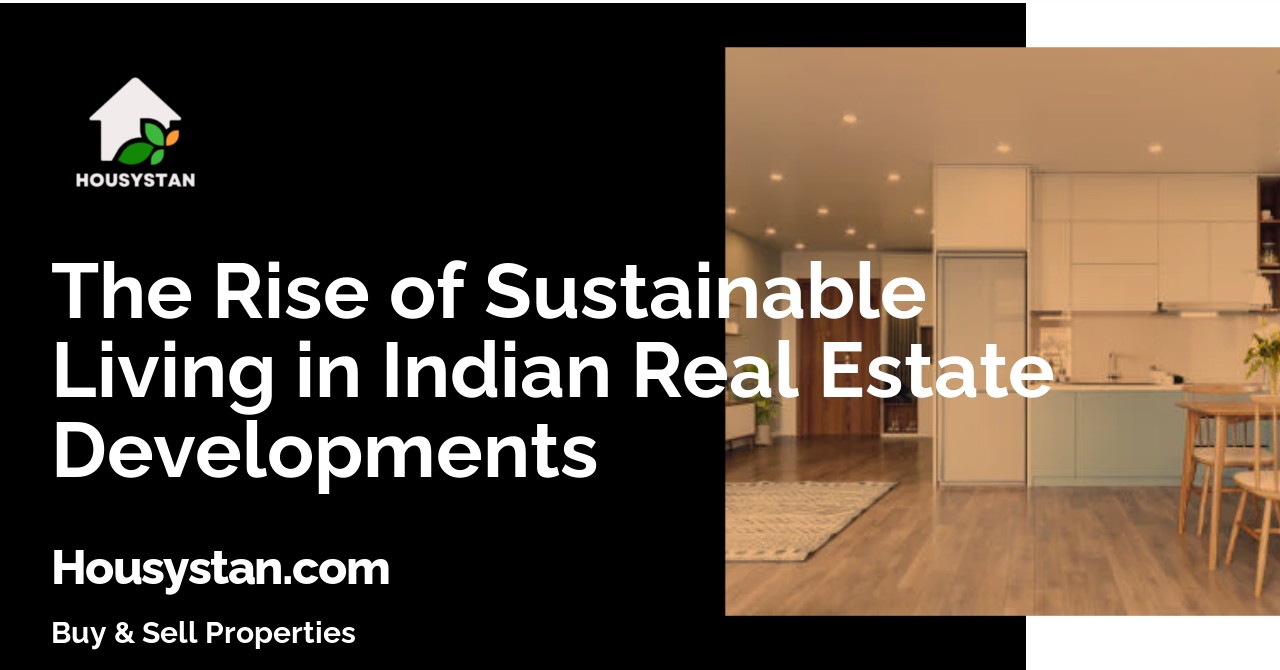The Rise of Sustainable Living in Indian Real Estate Developments
Read latest blogs and articles from Housystan

The Information mentioned here was last updated on:
18/2/2026The Rise of Sustainable Living in Indian Real Estate Developments
Introduction: The Sustainability Wave Sweeping Indian Real Estate
India’s real estate landscape is undergoing a remarkable transformation. With rapid urbanization, soaring energy costs, and mounting environmental concerns, the rise of sustainable living in Indian real estate developments is more than just a trend—it’s a necessity. Developers, investors, and homebuyers alike are increasingly prioritizing eco-friendly design principles, energy-efficient technologies, and green certifications. The result is a major shift in how new projects are conceived, constructed, and marketed across the country.
- Verified Tenants/Buyers
- Unlimited Property Listing
- Zero subscription/charges fee
Understanding Sustainable Living in Real Estate
Sustainable living in real estate refers to the integration of environmentally responsible practices in every aspect of property development. This encompasses everything from architectural planning and construction materials to energy consumption, water conservation, and waste management. The core objective is to minimize the ecological footprint while enhancing the quality of life for residents and communities.
Key Drivers Behind the Shift Towards Sustainable Development
Several factors are fueling the momentum towards sustainable real estate in India. Urban population growth is straining existing infrastructure and resources. Climate change, with its unpredictable weather patterns and rising temperatures, is urging developers to rethink conventional building methods. Moreover, government initiatives—such as the Smart Cities Mission and sustainable building codes—are encouraging stakeholders to adopt green building practices.
Green Building Certifications: The New Benchmark
Green certifications have emerged as a gold standard for sustainable real estate in India. Ratings like IGBC (Indian Green Building Council), GRIHA (Green Rating for Integrated Habitat Assessment), and LEED (Leadership in Energy and Environmental Design) validate the environmental performance of a building. Developers are increasingly seeking these certifications to enhance their projects’ marketability, value, and credibility. Homebuyers, in turn, are drawn to the promise of lower utility costs, healthier indoor environments, and a reduced carbon footprint.
Innovative Eco-Friendly Features in Modern Developments
Today’s sustainable real estate projects incorporate a host of innovative features. Rooftop solar panels, rainwater harvesting systems, and energy-efficient lighting have become almost standard. Developers are also focusing on green roofs, vertical gardens, and the use of low-VOC (volatile organic compounds) paints and recycled construction materials. Smart home automation further optimizes energy usage, while dedicated green spaces and community gardens promote wellness and biodiversity.
Water Conservation: A Critical Component
Water scarcity is a pressing concern in many Indian cities. Sustainable real estate developments address this challenge through advanced water management systems. Rainwater harvesting, greywater recycling, and low-flow fixtures help reduce consumption and wastage. Innovative landscaping techniques, such as xeriscaping, further minimize water use while creating visually appealing open spaces.
Energy Efficiency and Renewable Energy Adoption
With energy prices on the rise, energy efficiency is a top priority for both developers and residents. Sustainable buildings make the most of natural lighting and ventilation, reducing the need for artificial heating and cooling. High-performance glazing, insulation, and energy-efficient appliances are now commonplace. Many projects are also investing in on-site renewable energy generation, such as rooftop solar power, to meet a portion of their electricity needs.
Waste Management and Circular Construction
Modern sustainable developments are embracing circular economy principles to minimize waste. Segregation at source, composting of organic waste, and responsible disposal of e-waste are being actively promoted. During construction, careful material selection, modular designs, and prefabrication techniques help limit construction waste and environmental impact.
Community Well-being and Social Sustainability
Sustainable living isn’t just about environmental benefits—it’s equally about people. New real estate developments in India are prioritizing amenities that enhance community well-being. These include pedestrian-friendly pathways, cycling tracks, recreational zones, and shared community spaces. Health-focused features like improved air quality systems, ample natural light, and noise reduction further contribute to a higher quality of life for residents.
Challenges and Opportunities in Scaling Sustainable Real Estate
Despite the clear benefits, the adoption of sustainable practices in Indian real estate faces challenges. Higher upfront costs, lack of awareness, and limited access to green technologies can deter smaller developers. However, the long-term value proposition—lower operational costs, increased property values, and regulatory incentives—makes sustainable development a compelling choice. As technology becomes more affordable and consumer demand grows, these barriers are expected to diminish steadily.
The Role of Government and Policy Support
Government policies play a pivotal role in advancing sustainable real estate in India. Incentives for green buildings, stricter building codes, and awareness campaigns are encouraging developers to embrace eco-friendly practices. Initiatives like the ‘Housing for All’ mission are also integrating sustainability goals, aiming to balance affordability with environmental responsibility.
The Future Outlook: Towards Greener Urban Spaces
The future of Indian real estate is undoubtedly green. As sustainability becomes a cornerstone of urban planning, the industry is set to witness a proliferation of green buildings, smart infrastructure, and resilient communities. Homebuyers are already factoring in sustainability credentials when making purchasing decisions, while investors recognize the long-term stability and appeal of eco-friendly properties.
Conclusion: Embracing a Greener Tomorrow
The rise of sustainable living in Indian real estate developments marks a significant turning point for the industry. By integrating green building practices, energy efficiency, water conservation, and community well-being, developers are not only addressing environmental challenges but also creating lasting value for residents and investors. As collective awareness builds and technologies evolve, sustainable real estate is poised to become the new norm, shaping the future of India’s cities for generations to come.